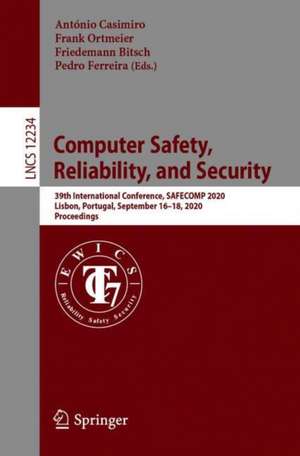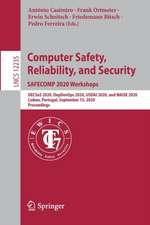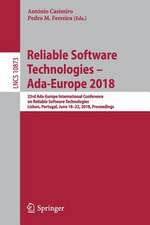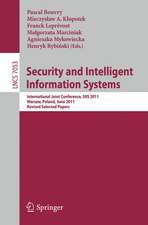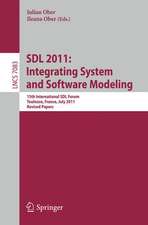Computer Safety, Reliability, and Security: 39th International Conference, SAFECOMP 2020, Lisbon, Portugal, September 16–18, 2020, Proceedings: Lecture Notes in Computer Science, cartea 12234
Editat de António Casimiro, Frank Ortmeier, Friedemann Bitsch, Pedro Ferreiraen Limba Engleză Paperback – 20 aug 2020
The 27 full and 2 short papers included in this volume were carefully reviewed and selected from 116 submissions. They were organized in topical sections named: safety cases and argumentation; formal verification and analysis; security modelling and methods; assurance of learning-enabled systems; practical experience and tools; threat analysis and risk mitigation; cyber-physical systems security; and fault injection and fault tolerance.
*The conference was held virtually due to the COVID-19 pandemic.
The chapter ‘Assurance Argument Elements for Off-the-Shelf, Complex Computational Hardware’ is available open access under an Open Government License 3.0 via link.springer.com.
Din seria Lecture Notes in Computer Science
- 20%
 Preț: 1061.55 lei
Preț: 1061.55 lei - 20%
 Preț: 307.71 lei
Preț: 307.71 lei - 20%
 Preț: 438.69 lei
Preț: 438.69 lei - 20%
 Preț: 579.30 lei
Preț: 579.30 lei -
 Preț: 410.88 lei
Preț: 410.88 lei - 17%
 Preț: 427.22 lei
Preț: 427.22 lei - 20%
 Preț: 596.46 lei
Preț: 596.46 lei - 15%
 Preț: 448.04 lei
Preț: 448.04 lei - 20%
 Preț: 353.50 lei
Preț: 353.50 lei -
 Preț: 389.49 lei
Preț: 389.49 lei - 20%
 Preț: 309.90 lei
Preț: 309.90 lei - 20%
 Preț: 645.28 lei
Preț: 645.28 lei - 20%
 Preț: 763.23 lei
Preț: 763.23 lei - 15%
 Preț: 580.46 lei
Preț: 580.46 lei - 20%
 Preț: 310.28 lei
Preț: 310.28 lei - 20%
 Preț: 655.02 lei
Preț: 655.02 lei - 20%
 Preț: 1183.14 lei
Preț: 1183.14 lei - 20%
 Preț: 340.32 lei
Preț: 340.32 lei -
 Preț: 449.57 lei
Preț: 449.57 lei - 20%
 Preț: 591.51 lei
Preț: 591.51 lei - 18%
 Preț: 938.83 lei
Preț: 938.83 lei - 20%
 Preț: 337.00 lei
Preț: 337.00 lei - 20%
 Preț: 649.50 lei
Preț: 649.50 lei - 20%
 Preț: 607.40 lei
Preț: 607.40 lei - 20%
 Preț: 1414.79 lei
Preț: 1414.79 lei - 20%
 Preț: 1024.44 lei
Preț: 1024.44 lei - 20%
 Preț: 583.40 lei
Preț: 583.40 lei - 20%
 Preț: 453.32 lei
Preț: 453.32 lei - 20%
 Preț: 575.49 lei
Preț: 575.49 lei - 20%
 Preț: 1075.26 lei
Preț: 1075.26 lei - 20%
 Preț: 585.88 lei
Preț: 585.88 lei - 20%
 Preț: 825.93 lei
Preț: 825.93 lei - 17%
 Preț: 360.20 lei
Preț: 360.20 lei - 20%
 Preț: 763.23 lei
Preț: 763.23 lei - 20%
 Preț: 340.32 lei
Preț: 340.32 lei - 20%
 Preț: 504.58 lei
Preț: 504.58 lei - 20%
 Preț: 369.13 lei
Preț: 369.13 lei - 20%
 Preț: 580.93 lei
Preț: 580.93 lei - 20%
 Preț: 343.62 lei
Preț: 343.62 lei - 20%
 Preț: 350.21 lei
Preț: 350.21 lei - 20%
 Preț: 583.40 lei
Preț: 583.40 lei - 20%
 Preț: 583.40 lei
Preț: 583.40 lei - 15%
 Preț: 438.59 lei
Preț: 438.59 lei - 20%
 Preț: 341.95 lei
Preț: 341.95 lei - 20%
 Preț: 238.01 lei
Preț: 238.01 lei - 20%
 Preț: 538.30 lei
Preț: 538.30 lei
Preț: 597.44 lei
Preț vechi: 746.80 lei
-20% Nou
Puncte Express: 896
Preț estimativ în valută:
114.36€ • 124.26$ • 96.12£
114.36€ • 124.26$ • 96.12£
Carte tipărită la comandă
Livrare economică 21 aprilie-05 mai
Preluare comenzi: 021 569.72.76
Specificații
ISBN-13: 9783030545482
ISBN-10: 3030545482
Pagini: 300
Ilustrații: XXIII, 450 p. 251 illus., 78 illus. in color.
Dimensiuni: 155 x 235 mm
Greutate: 0.66 kg
Ediția:1st ed. 2020
Editura: Springer International Publishing
Colecția Springer
Seriile Lecture Notes in Computer Science, Programming and Software Engineering
Locul publicării:Cham, Switzerland
ISBN-10: 3030545482
Pagini: 300
Ilustrații: XXIII, 450 p. 251 illus., 78 illus. in color.
Dimensiuni: 155 x 235 mm
Greutate: 0.66 kg
Ediția:1st ed. 2020
Editura: Springer International Publishing
Colecția Springer
Seriile Lecture Notes in Computer Science, Programming and Software Engineering
Locul publicării:Cham, Switzerland
Cuprins
Safety Cases and Argumentation.- Synthesis of Runtime Safety Monitors for Cyber-Physical Systems with Digital Dependability Identities.- Systematic Evaluation of (Safety) Assurance Cases.- Just Enough Formality in Assurance Argument Structures.- Towards Recertification of Modular Updates in Integrated Maritime Systems of Systems.- Formal Verification and Analysis.- A functional verification methodology for highly configurable, continuously operating safety-critical FPGA designs: Applied to the CERN RadiatiOn Monitoring Electronics (CROME).- A Compositional Semantics for Repairable BDMPs.- Model-Based Safety Analysis of Mode Transitions.- Efficient Translation of Safety LTL to DFA using Symbolic Automata Learning and Inductive Inference.- Security Modelling and Methods.- Automated Attacker Synthesis for Distributed Protocols.- An Attacker Modeling Framework for the Assessment of Cyber-Physical Systems Security.- Predicting Railway Signalling Commands using Neural Networks for Anomaly Detection.- Automated Anomaly Detection in CPS Log Files - A Time Series Clustering Approach.- Assurance of Learning-enabled Systems.- Assuring the Safety of Machine Learning for Pedestrian Detection at Crossings.- Safety-Aware Hardening of 3D Object Detection Neural Network Systems.- Model-Centered Assurance for Autonomous Systems.- A Safety Framework for Critical Systems Utilising Deep Neural Networks.- Assurance Argument Elements for Off-the-Shelf, Complex Computational Hardware.- Quantifying Assurance in Learning-enabled Systems.- Practical Experience and Tools.- Cyber Security of Neural Networks in Medical Devices.- FASTEN.Safe: A Model-driven Engineering Tool to Experiment with Checkable Assurance Cases.- Threat Analysis and Risk Mitigation.- On Validating Attack Trees with Attack Effects.- Safety meets Security: Using ISA-62443 for a Highly Automated Road Vehicle.- Threat Analysis Framework for Safety Architectures in SCDL.- Cyber-Physical Systems Security.- Efficient Load-Time Diversity for an Embedded Real-Time Operating System.- Towards an Automated Exploration of Secure IoT/CPS Design-Variants.- Securing Electric Vehicle Charging Systems through Component Binding.- Fault Injection and Fault Tolerance.- Using Hardware-In-Loop-Based Fault Injection to Determine the Effects of Control Flow Errors in Industrial Control Programs.- On Configuring a Testbed for Dependability Experiments: Guidelines and Fault Injection Case Study.- A Classification of Faults Covering the Human-Computer Interaction Loop.
